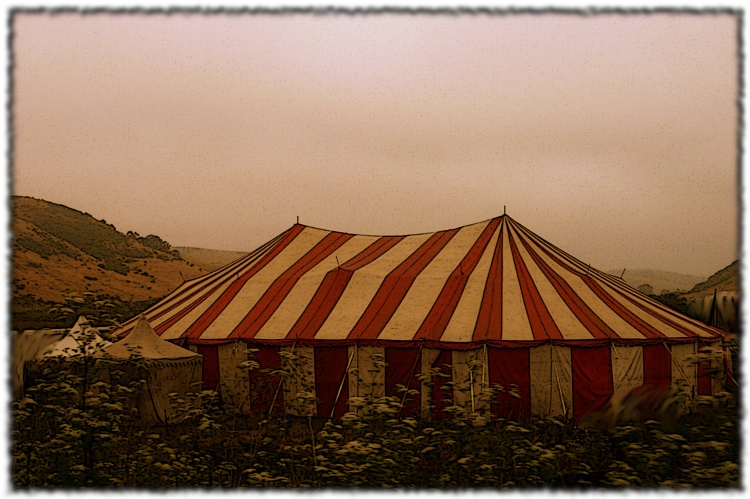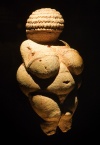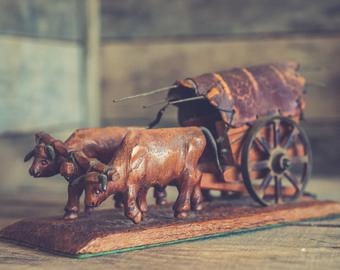Canvas of the Mother: Difference between revisions
No edit summary |
|||
| (29 intermediate revisions by 2 users not shown) | |||
| Line 1: | Line 1: | ||
;[[St.Calenda's Wandering Pageant, Odeum & Lunar Fair]] | ;[[St.Calenda's Wandering Pageant, Odeum & Lunar Fair]] | ||
== | == Introduction == | ||
[[File:Canvas of the Mother.jpg| | [[File:Canvas of the Mother.jpg|750px]] | ||
<br> | <br> | ||
<br> | <br> | ||
''' | ===Appearance=== | ||
''The "Canvas of the Mother" is a red and white striped tent that serves as the main venue of the larger performances. In'' ''later days such tents would become more common, but in the years between the fall of the Old Empire and the Wars of Christ, this tent was a'' ''one-of-a-kind artistic and engineering marvel.'' | |||
===Background=== | |||
'''Its story goes something like this: ''' ''Many years ago - no one really remembers when, The Pageant Master led the Pageant to the farthest East in search of new acts and new markets for the Pageant to sell its wares. In distant Cathay, the Pageant came to a city larger than any seen before and there the entertainers remained for several seasons.'' | |||
''In this unnamed city, Mauritanus encountered an artisan in the medium of silk and was enchanted with the beautiful pavilions that this man made for the authorities of the great city. When | ''In this unnamed city, Mauritanus encountered an artisan in the medium of silk and was enchanted with the beautiful pavilions that this man made for the authorities of the great city. When the Master of Ceremonies asked how much such a silken tent would cost, the artisan laughed and said such wondrous palaces of silk were not for foreigners or mere nomads. The Master of Ceremonies was not so easily dissuaded and in turn asked the artisan his hearts desire? The artisan was an old man at this point and as he and his equally elderly wife had failed to produce children, he honestly replied -- a son to follow me in my craft. Mauritanus gravely nodded in understanding and asked if he might give the artisan's wife a gift, a potion that would insure her fecundity and give the elderly couple a child. At first the artisan was dubious, but the Master of Ceremonies promised him a son if his wife drank the elixir. The elderly artisan in silk took the foreigners potion to his wife and told her what the strange dark man had said. The elderly couple were so desperate for a son, or any child, that they used the potion and coupled thereafter.'' | ||
''A season passed and the artisan's elderly wife began to show the signs of pregnancy, when this became clear the artisan went to see Mauritanus among the pageanteers and falling to his knees he thanked the dark stranger. Mauritanus smiled and raised the artisan to his feet and once again asked the old man to make a silk pavilion for the pageant, the artisan could scarcely refuse even though his people would see him as a traitor for creating such a magnificent palace of silk for a group of foreign entertainers. The Master of Ceremonies gave to the old man a list of demanding specifications for the pavilion, the materials needed were quite expensive, but Mauritanus provided chests of gold to purchase such quantities of silk as would be required and to find the rarest red dyes needed to color the silk.'' | ''A season passed and the artisan's elderly wife began to show the signs of pregnancy, when this became clear the artisan went to see Mauritanus among the pageanteers and falling to his knees he thanked the dark stranger. Mauritanus smiled and raised the artisan to his feet and once again asked the old man to make a silk pavilion for the pageant, the artisan could scarcely refuse even though his people would see him as a traitor for creating such a magnificent palace of silk for a group of foreign entertainers. The Master of Ceremonies gave to the old man a list of demanding specifications for the pavilion, the materials needed were quite expensive, but Mauritanus provided chests of gold to purchase such quantities of silk as would be required and to find the rarest red dyes needed to color the silk.'' | ||
''In the end, the grand pavilion was completed, but when Mauritanus came to collect the old artisan's opus he came upon the household in mourning for the old man | ''In the end, the grand pavilion was completed, but when Mauritanus came to collect the old artisan's opus he came upon the household in mourning for the old man had passed away with the completion of his finest work. The grieving widow chose to receive the foreign entertainer for she was also a new mother and wished to thanks him personally. The meeting took place in the mourning tent and there the old woman and Master of Ceremonies spoke for some time. When their conversation ended, she and her entire household brought the grand pavilion to the Pageant and left their old lives behind.'' | ||
===Characteristics=== | |||
'''Contents:''' [[File:Statue of the Mother.jpg|left|100px]] [[File:Wagon of the Mother.jpg|right]]The ''Reliquary of the Mother'' is an old wooden wagon that is placed in the center of the main tent. The wagon is made of a pale wood and forms a kind of cabinet on wheels. When the carved double doors in the rear of the wagon are opened, there is revealed a ancient stone statue of a mother figure. Like the ''Venus of Willendorf'' this statue is unimaginably old and like that latter discovery she is only the vague outline of a plush female figure. Unlike other statues of this kind, the ''Statue of the Mother'' was carved in a sitting position and resides in-state upon a throne of pale wood attached to the wagon. Within the reliquary are votive offerings, some are of bees-wax candles in all the hues of the rainbow, others are incense or wine, and many valuables left for the ''lady of the tent.'' The wagon is always present for performances and the center of the tent is her wagon's accustomed place. On those rare occasions that one pageanteer accuses another of a crime or some outsider acts unjustly towards the Pageant, a trial of sorts is held here with the wagon being drawn around the inner circumference of the tent by two oxen until the wagon's tracks cross one another. Within the circle, the accused is offered the right to speak their peace and if possible prove their innocence. If the accused is found guilty, that individual is locked up within the ''Reliquary of the Mother'' for seven days, if they are found to be still alive on the seventh night, then they are considered free of guilt. Most however are never seen again. | |||
'''Contents:''' [[File:Statue of the Mother.jpg|left|100px]]The ''Reliquary of the Mother'' is an old wooden wagon that is placed in the center of the main tent. The wagon is made of a pale wood and forms a kind of cabinet on wheels. When the carved double doors in the rear of the wagon are opened, there is revealed a ancient stone statue of a mother figure. Like the ''Venus of Willendorf'' this statue is unimaginably old and like that latter discovery she is only the vague outline of a plush female figure. Unlike other statues of this kind, the ''Statue of the Mother'' was carved in a sitting position and resides in-state upon a throne of pale wood attached to the wagon. Within the reliquary are votive offerings, some are of bees-wax candles in all the hues of the rainbow, others are incense or wine, and many valuables left for the ''lady of the tent.'' The wagon is always present for performances and the center of the tent is her wagon's accustomed place. On those rare occasions that one pageanteer accuses another of a crime or some outsider acts unjustly towards the Pageant, a trial of sorts is held here with the wagon being drawn around the inner circumference of the tent by two | |||
---- | ---- | ||
<br> | <br> | ||
<br> | <br> | ||
---- | ---- | ||
==== | ====The Master of Ceremonies==== | ||
The Ringmaster lives in a tent that connects directly to the Canvas of the Mother. His tent is small on the outside. Some people have been shocked to see that curtains reveal a much larger tent on the inside.<br> | |||
{| class="wikitable" style="margin: left;" | |||
|[[File:Ringmaster Mauritanus Vedastus.jpg|200px]] '''[[Mauritanus Vedastus]]''' -- ''Ringmaster & Master of Ceremonies'' {African} | |||
|} | |||
:* [[Aedelpryd Laelia]] - Servant girl to the Ringmaster | |||
:* [[Irma Laelia]] - Servant girl to the Ringmaster | |||
==== Zhu Family of Acrobats ==== | |||
A family of Chinese acrobats. They have three small wagons that they travel in. Most of the time the acrobats can be found in the Canvas of the Mother. | |||
{| class="wikitable" style="margin: left;" | {| class="wikitable" style="margin: left;" | ||
|[[File: | |[[File:Zhu Zan acrobat.jpg|200px]] '''[[Zhu Zan]]''' -- (Deceased - December of 1096 - [[Erdach Kodesh]] -- The former ''Master of Two Worlds'') | ||
|} | |} | ||
{| class="wikitable" style="margin: left;" | {| class="wikitable" style="margin: left;" | ||
|[[File: | |[[File:Acrobat Zhu An.jpg|200px]] '''[[Zhu An]]''' -- (Deceased - December of 1096 - [[Erdach Kodesh]] -- Slain by ??) | ||
|} | |} | ||
{| class="wikitable" style="margin: left;" | {| class="wikitable" style="margin: left;" | ||
|[[File: | |[[File:Acrobat Zhu Chen.jpg|200px]] '''[[Zhu Chen]]''' -- '' ()'' | ||
|} | |} | ||
{| class="wikitable" style="margin: left;" | {| class="wikitable" style="margin: left;" | ||
|[[File: | |[[File:Acrobat Zhu Xia.jpg|200px]] '''[[Zhu Xia]]''' -- '' ()'' | ||
|} | |} | ||
==== | ==== Lodge of the Dervishes ==== | ||
{| class="wikitable" style="margin: left;" | {| class="wikitable" style="margin: left;" | ||
|[[File: | |[[File:Mortal Salome the serpent dancer.jpg|200px]] '''[[Salome]]''' -- ''Wife of the Serpent'' -- {} [] | ||
|} | |} | ||
{| class="wikitable" style="margin: left;" | {| class="wikitable" style="margin: left;" | ||
|[[File: | |[[File:Mortal Sunngifu.jpg|200px]] '''[[Sunniva]]''' -- ''The Wolf-dancer '' -- {A young Saxon woman married to Eadwulf} [New Member] | ||
|} | |} | ||
{| class="wikitable" style="margin: left;" | {| class="wikitable" style="margin: left;" | ||
|[[File: | |[[File:Mortal firedancer Chanda.jpg|200px]] '''[[Chanda]]''' -- ''The Fire Dancer'' {Indian} [deceased] | ||
|} | |} | ||
{| class="wikitable" style="margin: left;" | {| class="wikitable" style="margin: left;" | ||
|[[File: | |[[File:Alternian Adebola Kader.jpg|200px]] '''[[Adebola Kader]]''' -- ''Alternian Belly Dancer'' {Egyptian(Alternian)} [] | ||
|} | |} | ||
| Line 55: | Line 68: | ||
{| class="wikitable" style="margin: left;" | {| class="wikitable" style="margin: left;" | ||
|[[ |200px]] '''[[Bessarion Michelakos]]''' -- '''' {} [] | |[[File:Bessarion Michelakos.jpg|200px]] '''[[Bessarion Michelakos]]''' -- '''' {Master Juggler} [deceased - December of 1096 - Killed by Aegon Nightshade] | ||
|[[File:Appalonia Michelakos.jpg|200px]] '''[[Appalonia Michelakos]]''' -- '''' {Mistress of Disappearing Objects} [] | |||
|} | |} | ||
{| class="wikitable" style="margin: left;" | {| class="wikitable" style="margin: left;" | ||
|[[ |200px]] '''[[ | |[[File:Damokles Michelakos.jpg|200px]] '''[[Damokles Michelakos]]''' -- '''' {Prince of Jugglers} [] | ||
|} | |} | ||
{| class="wikitable" style="margin: left;" | {| class="wikitable" style="margin: left;" | ||
|[[ |200px]] '''[[Damokles Michelakos]]''' -- '''' {} [] | |[[File:Melete Michelakos.jpg|200px]] '''[[Melete Michelakos]]''' -- '''' {Princess of Jugglers(wife of Damokles)} [] | ||
|[[File:Herais Michelakos.jpg|200px]] '''[[Herais Michelakos]]''' -- '''' {Princess of Jugglers(wife of Damokles)} [] | |||
|} | |||
{| class="wikitable" style="margin: left;" | |||
|[[File:Laios Michelakos.jpg|200px]] '''[[ Laios "Hyacinthus" Michelakos]]''' -- '''' {The Handsomest Juggler of All} [] | |||
|} | |} | ||
{| class="wikitable" style="margin: left;" | {| class="wikitable" style="margin: left;" | ||
|[[ |200px]] '''[[ | |[[File: Gratiana Odila Michelakos.jpg|200px]] '''[[ Gratiana Odila Michelakos]]''' -- '''' {The Queen Maiden} [] | ||
|} | |} | ||
| Line 78: | Line 98: | ||
|} | |} | ||
{| class="wikitable" style="margin: left;" | {| class="wikitable" style="margin: left;" | ||
|[[ |200px]] '''[[Stella Hoefler]]''' -- '' | |[[File:Stella Hoefler.jpg|200px]] '''[[Stella Hoefler]]''' -- ''The All purpose Assistant'' {} [Germanic] | ||
|} | |} | ||
{| class="wikitable" style="margin: left;" | {| class="wikitable" style="margin: left;" | ||
| Line 84: | Line 104: | ||
|} | |} | ||
{| class="wikitable" style="margin: left;" | {| class="wikitable" style="margin: left;" | ||
|[[ |200px]] '''[[Hrothgar]]''' -- '' | |[[File:Hrothgar.jpg|200px]] '''[[Hrothgar]]''' -- ''Stilt Walker'' {} [Anglo-Saxon] | ||
|} | |} | ||
{| class="wikitable" style="margin: left;" | {| class="wikitable" style="margin: left;" | ||
|[[ |200px]] '''[[Behnam Darzi]]''' -- ''The Tailor'' {} [Persian] | |[[File:Behnam Darzi.jpg|200px]] '''[[Behnam Darzi]]''' -- ''The Tailor'' {} [Persian] | ||
|} | |} | ||
{| class="wikitable" style="margin: left;" | {| class="wikitable" style="margin: left;" | ||
|[[ |200px]] '''[[Dui]]''' -- ''The Pict'' {} [Germanic] | |[[File:Dui.jpg|200px]] '''[[Dui]]''' -- ''The Pict'' {} [Germanic] | ||
|} | |} | ||
---- | ---- | ||
Latest revision as of 20:28, 15 October 2019
Introduction
Appearance
The "Canvas of the Mother" is a red and white striped tent that serves as the main venue of the larger performances. In later days such tents would become more common, but in the years between the fall of the Old Empire and the Wars of Christ, this tent was a one-of-a-kind artistic and engineering marvel.
Background
Its story goes something like this: Many years ago - no one really remembers when, The Pageant Master led the Pageant to the farthest East in search of new acts and new markets for the Pageant to sell its wares. In distant Cathay, the Pageant came to a city larger than any seen before and there the entertainers remained for several seasons.
In this unnamed city, Mauritanus encountered an artisan in the medium of silk and was enchanted with the beautiful pavilions that this man made for the authorities of the great city. When the Master of Ceremonies asked how much such a silken tent would cost, the artisan laughed and said such wondrous palaces of silk were not for foreigners or mere nomads. The Master of Ceremonies was not so easily dissuaded and in turn asked the artisan his hearts desire? The artisan was an old man at this point and as he and his equally elderly wife had failed to produce children, he honestly replied -- a son to follow me in my craft. Mauritanus gravely nodded in understanding and asked if he might give the artisan's wife a gift, a potion that would insure her fecundity and give the elderly couple a child. At first the artisan was dubious, but the Master of Ceremonies promised him a son if his wife drank the elixir. The elderly artisan in silk took the foreigners potion to his wife and told her what the strange dark man had said. The elderly couple were so desperate for a son, or any child, that they used the potion and coupled thereafter.
A season passed and the artisan's elderly wife began to show the signs of pregnancy, when this became clear the artisan went to see Mauritanus among the pageanteers and falling to his knees he thanked the dark stranger. Mauritanus smiled and raised the artisan to his feet and once again asked the old man to make a silk pavilion for the pageant, the artisan could scarcely refuse even though his people would see him as a traitor for creating such a magnificent palace of silk for a group of foreign entertainers. The Master of Ceremonies gave to the old man a list of demanding specifications for the pavilion, the materials needed were quite expensive, but Mauritanus provided chests of gold to purchase such quantities of silk as would be required and to find the rarest red dyes needed to color the silk.
In the end, the grand pavilion was completed, but when Mauritanus came to collect the old artisan's opus he came upon the household in mourning for the old man had passed away with the completion of his finest work. The grieving widow chose to receive the foreign entertainer for she was also a new mother and wished to thanks him personally. The meeting took place in the mourning tent and there the old woman and Master of Ceremonies spoke for some time. When their conversation ended, she and her entire household brought the grand pavilion to the Pageant and left their old lives behind.
Characteristics
Contents:
The Reliquary of the Mother is an old wooden wagon that is placed in the center of the main tent. The wagon is made of a pale wood and forms a kind of cabinet on wheels. When the carved double doors in the rear of the wagon are opened, there is revealed a ancient stone statue of a mother figure. Like the Venus of Willendorf this statue is unimaginably old and like that latter discovery she is only the vague outline of a plush female figure. Unlike other statues of this kind, the Statue of the Mother was carved in a sitting position and resides in-state upon a throne of pale wood attached to the wagon. Within the reliquary are votive offerings, some are of bees-wax candles in all the hues of the rainbow, others are incense or wine, and many valuables left for the lady of the tent. The wagon is always present for performances and the center of the tent is her wagon's accustomed place. On those rare occasions that one pageanteer accuses another of a crime or some outsider acts unjustly towards the Pageant, a trial of sorts is held here with the wagon being drawn around the inner circumference of the tent by two oxen until the wagon's tracks cross one another. Within the circle, the accused is offered the right to speak their peace and if possible prove their innocence. If the accused is found guilty, that individual is locked up within the Reliquary of the Mother for seven days, if they are found to be still alive on the seventh night, then they are considered free of guilt. Most however are never seen again.
The Master of Ceremonies
The Ringmaster lives in a tent that connects directly to the Canvas of the Mother. His tent is small on the outside. Some people have been shocked to see that curtains reveal a much larger tent on the inside.
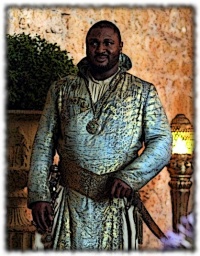 Mauritanus Vedastus -- Ringmaster & Master of Ceremonies {African} Mauritanus Vedastus -- Ringmaster & Master of Ceremonies {African}
|
- Aedelpryd Laelia - Servant girl to the Ringmaster
- Irma Laelia - Servant girl to the Ringmaster
Zhu Family of Acrobats
A family of Chinese acrobats. They have three small wagons that they travel in. Most of the time the acrobats can be found in the Canvas of the Mother.
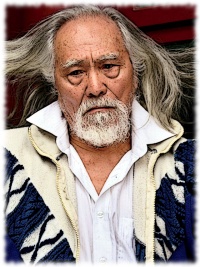 Zhu Zan -- (Deceased - December of 1096 - Erdach Kodesh -- The former Master of Two Worlds) Zhu Zan -- (Deceased - December of 1096 - Erdach Kodesh -- The former Master of Two Worlds)
|
 Zhu An -- (Deceased - December of 1096 - Erdach Kodesh -- Slain by ??) Zhu An -- (Deceased - December of 1096 - Erdach Kodesh -- Slain by ??)
|
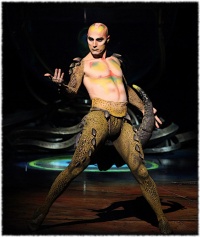 Zhu Chen -- () Zhu Chen -- ()
|
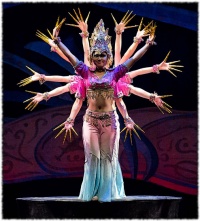 Zhu Xia -- () Zhu Xia -- ()
|
Lodge of the Dervishes
 Salome -- Wife of the Serpent -- {} [] Salome -- Wife of the Serpent -- {} []
|
 Sunniva -- The Wolf-dancer -- {A young Saxon woman married to Eadwulf} [New Member] Sunniva -- The Wolf-dancer -- {A young Saxon woman married to Eadwulf} [New Member]
|
 Chanda -- The Fire Dancer {Indian} [deceased] Chanda -- The Fire Dancer {Indian} [deceased]
|
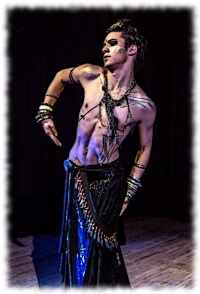 Adebola Kader -- Alternian Belly Dancer {Egyptian(Alternian)} [] Adebola Kader -- Alternian Belly Dancer {Egyptian(Alternian)} []
|
Michelakos Family of Jugglers
A family of Byzantine performers.
 Bessarion Michelakos -- ' {Master Juggler} [deceased - December of 1096 - Killed by Aegon Nightshade] Bessarion Michelakos -- ' {Master Juggler} [deceased - December of 1096 - Killed by Aegon Nightshade]
|
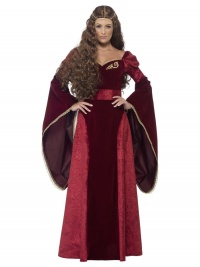 Appalonia Michelakos -- ' {Mistress of Disappearing Objects} [] Appalonia Michelakos -- ' {Mistress of Disappearing Objects} []
|
 Damokles Michelakos -- ' {Prince of Jugglers} [] Damokles Michelakos -- ' {Prince of Jugglers} []
|
 Melete Michelakos -- ' {Princess of Jugglers(wife of Damokles)} [] Melete Michelakos -- ' {Princess of Jugglers(wife of Damokles)} []
|
 Herais Michelakos -- ' {Princess of Jugglers(wife of Damokles)} [] Herais Michelakos -- ' {Princess of Jugglers(wife of Damokles)} []
|
 Laios "Hyacinthus" Michelakos -- ' {The Handsomest Juggler of All} [] Laios "Hyacinthus" Michelakos -- ' {The Handsomest Juggler of All} []
|
 Gratiana Odila Michelakos -- ' {The Queen Maiden} [] Gratiana Odila Michelakos -- ' {The Queen Maiden} []
|
Other Performers
 Aref Shirazi -- Lord of Archers {} [Persian] Aref Shirazi -- Lord of Archers {} [Persian]
|
 Dobroslav -- Sword Swallower {} [Slavic] Dobroslav -- Sword Swallower {} [Slavic]
|
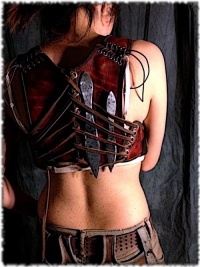 Saskia -- The Knife Thrower {} [Germanic] Saskia -- The Knife Thrower {} [Germanic]
|
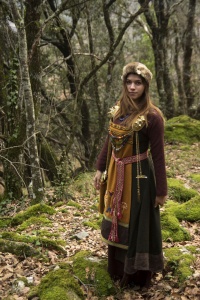 Stella Hoefler -- The All purpose Assistant {} [Germanic] Stella Hoefler -- The All purpose Assistant {} [Germanic]
|
 Mongfind -- The Princess {} [Pictish] Mongfind -- The Princess {} [Pictish]
|
 Hrothgar -- Stilt Walker {} [Anglo-Saxon] Hrothgar -- Stilt Walker {} [Anglo-Saxon]
|
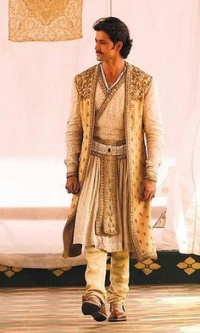 Behnam Darzi -- The Tailor {} [Persian] Behnam Darzi -- The Tailor {} [Persian]
|
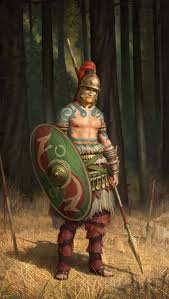 Dui -- The Pict {} [Germanic] Dui -- The Pict {} [Germanic]
|
